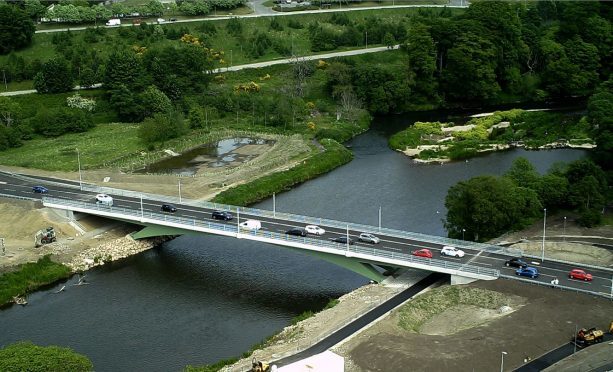Two new reports have highlighted a series of blunders which caused Aberdeen’s first bridge construction in thirty years to go months over schedule and millions over budget.
The £22.3million Third Don Crossing, soon to be named the Diamond Bridge, was first proposed by council officials in April 2003.
Thirteen years and numerous council administrations later, the long-awaited link between Bridge of Don and Tillydrone finally opened to motorists in June this year around seven months behind schedule and around £4million over its original budget.
Now, the brace of reports, both by internal officials within the council and watchdog Audit Scotland, have been released to the council’s audit committee.
The contract for the Third Don Crossing was awarded in June 2014 for £18m with a completion date initially set for December 2015.
But a number of problems hindered the venture, including the project manager taking “suddenly sick” upon construction starting, followed by the tragic death of workman Ian Walker this January.
The reports found there was “limited consideration of any detailed market analysis” before a tender was chosen and bids were assessed primarily on price, while problems in the “relationships” between the council and contractors Balfour Beattie were identified.
The council’s report by Dorothy Cowie, an independent consultant, said the authority received six bids, ranging from £14.33m to £21.73m, on the bridge built to carry 10,000 vehicles a day.
It added: “Given the complex nature of the project, the risk factors involved and the high value of the works, the turnaround time for bidders to submit offers seems relatively short.
“In such circumstances, there is a danger that bidders are not able to fully assess the contract risks or to work with their supply chains to develop alternative approaches or innovative solutions for the council to consider.
“It is also surprising that the bids were assessed on the basis of price only.
“One of the issues that arose during the construction phase related to the design of the bridge in relation to the bearings.
“The focus of the service department at the time was on finding a practical solution to the technical issue to keep the project on time.
“A decision was taken not to make any recourse to the rights and obligations in the contract at that time, because it was felt by the service that this could have resulted in a shift in focus of the designers.
“It could possibly [leave] them considering their technical and professional positions with their insurers rather than the solution.
“There was no one specific element that resulted in the late delivery and cost overrun. However, as the report highlights, there were several factors that influenced that situation.”
The Audit Scotland report added: “Throughout the year, the completion date was revised and the commentary suggested there were delays due to bad weather and unexpected work.
SNP group leader Stephen Flynn launched a blistering attack on the administration over “failures” in the creation of the multimillion-pound bridge and called for lessons to be learned with future projects.
He added: “Having spoken to officers, I have every confidence that such mistakes won’t happen again.
“But I think the administration should hold up their hands and apologise, we need to ensure that the people of the city have confidence in the council to deliver projects like this.
“The level of information that councillors received was not enough and key elected members were not properly kept informed of progress.
“There are now numerous capital projects which are over budget and over schedule.
“I hope the administration realise they should learn lessons from (the Don Crossing) and try to keep projects on time and budget.”
Administration transport spokesman Ross Grant, who is also a Tillydrone councillor, said lessons would be learned, but added the new bridge, combined with the multi-million pound Berryden corridor plan, would ease traffic flow through the city for years to come.
He said: “This was a pretty complex development and part of a major delay was problems with an underground pipeline, so Balfour Beattie had to adapt their programme.
“It’s very important we learn lessons from the reports, but also remember that with roads projects on this scale, it is not uncommon for unintended variables which lead to problems.
“You don’t even need to look just to Aberdeen, the Queensferry crossing has also had problems.
“Our jobs are to push projects forward, but we also need to minimise disruption to local communities.”
